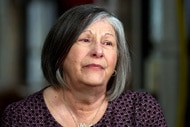Create a free profile to get unlimited access to exclusive videos, breaking news, sweepstakes, and more!
Mother Was Convicted In 2003 Of Killing Her 4 Kids, But Now Scientists Believe The Deaths Could Have Been Due To Natural Causes
“She has endured the death of her four children and has been wrongly incarcerated because the justice system has failed her," a petition, signed by 90 scientists, medical practitioners and other professionals, states in pushing for a pardon for Kathleen Folbigg.

Eighteen years ago, Kathleen Folbigg was convicted of killing her four children—making her one of Australia’s worst female serial killers—but nearly 100 scientists have now called her conviction into question, arguing the children’s deaths may have been due to natural causes.
“Ms Folbigg has suffered and continues to suffer emotional and psychological trauma and physical abuse in custody,” scientists wrote in a petition to the New South Wales state governor requesting a pardon for the now 53-year-old. “She has endured the death of her four children and has been wrongly incarcerated because the justice system has failed her.”
The petition signed in March by 90 scientists, medical practitioners and other professionals—including two Nobel laureates—asked the governor to pardon Folbigg because of “significant positive evidence” suggesting “natural causes of death” for all four children.
But to date, the scientists’ opinion has not swayed authorities overseeing her case. Just weeks after the petition was filed, three judges threw out her challenge to retired judge Justice Reginald Blanch’s earlier decision to uphold her convictions, according to the Associated Press.
Folbigg was convicted by a jury in 2003 after prosecutors argued that she had systematically smothered each child to death in separate instances that spanned a decade, killing each of her children before they reached their second birthday, according to a 2019 inquiry in the case.
She was convicted of murder in the deaths of Patrick, Laura and Sarah and manslaughter in the death of her first child, Caleb, who died in 1989 at just 19 days old.
She was sentenced in October of 2003 to 40 years behind bars, without the possibility of parole for 30 years. It was later determined on appeal that Folbigg would be eligible for parole after serving 25 years behind bars, but many believe her conviction was a huge miscarriage of justice that sent an innocent woman to prison.
In the latest petition to the governor, scientists supporting her case argued that there was “no medical evidence” to indicate smothering and said that after conducting genome sequencing on the children, they discovered that Laura and Sarah had a “novel mutation” in the CALM2 gene.
Mutations in the gene “are one of the best recognized causes of sudden death in infancy and childhood,” and researchers believe the mutation in the case of the Folbigg children was likely “pathogenic and arrhythmogenic,” according to the petition.
Scientists also believe the deaths of her two sons could also be attributed to natural causes.
A ‘Very Disturbed’ Child
Years before Folbigg was ever convicted of killing her children, her life had been marred by violence. When she was just 18 months old, her father Thomas Britton stabbed her mother to death during a “domestic dispute,” according to the 2019 inquiry.
He served approximately 15 years behind bars before was later deported to England.
A medical officer would later determine it was “likely” she had been abused by her father as an infant and was found to be a “very disturbed girl” during a psychological assessment.
She reportedly began her education with good behavior and attendance, but by her fifth year of school she was described as being “inattentive, disruptive and defiant” and later dropped out before ever completing high school amid tensions with her foster mother.
Folbigg met her husband, Craig Folbigg, at a disco when she was 18 and married him two years later.
The Mysterious Deaths
The couple had their first child, Caleb, on Feb. 1, 1980. She described herself at the time as being “completed, with a husband, home and baby,” according to the inquiry.
But just 19 days later, Caleb died from what an autopsy would determine was “a direct cause” of sudden infant death syndrome.
She gave birth to her son Patrick just over a year later on June 3, 1990. At four months of age, he had an apparent life-threatening event that left him with brain damage, visual impairment and seizures, the inquiry reports.
He died in February of 1991 in what the medical examiner determined to be “asphyxia due to airway obstruction” and epileptic fits.
Folbigg would later say she had been “severely depressed” after his death and had no drive to do anything but the couple would eventually decide once again to begin a family, the inquiry states.
Her daughter Sarah was born on Oct. 14, 1992 and appeared to be a normal baby, according to sleep study performed when she was three weeks old. She died 10 months later in August of 1993 from what the death certificate listed as SIDs.
Folbigg had reportedly taken Sarah to a general practitioner four days earlier for a “croupy cough” and was given antibiotics, according to the petition to the governor.
The couple’s last child, Laura, was born on Aug. 7, 1997 after the couple had once again tried to have children. She died on May 1, 1999 at 18 months old. Craig Folbigg would later tell investigators his wife had been aggravated with the child earlier that morning and pinned her hands down to try to feed her breakfast cereal, before putting her on the ground and telling her to “go to your f---ing father,” according to the inquiry.
Laura also died two days after being treated for a respiratory infection and an autopsy would later find that she had “myocarditis,” or an inflammation of the heart wall.
Convicted For The Murders
Prosecutors argued that all four children had last been seen alive by their mother and Caleb, Laura and Sarah all appeared normal before their deaths.
The case against Folbigg was largely based on circumstantial evidence discovered by her estranged husband in her journal, CNN reports.
"I feel like the worst mother on this Earth, scared that (Laura) will leave me now, like Sarah did. I knew I was short tempered and cruel sometimes to her and she left, with a bit of help," Folbigg wrote, according to the news outlet. "It can't happen again. I'm ashamed of myself. I can't tell (my husband) about it because he'll worry about leaving her with me.”
Folbigg would later say from prison in 2018 that the “with a bit of help” line was in reference to God or a higher power.
In another entry, she had written “Obviously, I am my father’s daughter,” according to the Associated Press. Prosecutors argued that the reference to her father suggested she had “inherited the sin of killing” from him; however, Folbigg disputed that claim.
“I believed and thought at the time that my father’s actions ruined my life and my life never seemed to go right from there,” she said. “Was I paying a price?”
Prosecutors also relied on a theory by pediatrician Roy Meadow in contending that the large number of deaths was too high to be accidental.
“One sudden infant death is a tragedy, two is suspicious and three is murder, until proven otherwise,” the maxim states
Signs Indicating a Natural Death?
However, scientists have taken a new look at the case and believe that genetics and other scientific factors that could help explain the deaths.
“It is deeply concerning that there is not a mechanism to appropriately weigh up all medical and scientific evidence in a case of this nature,” Australian Academy of Sciences President John Shine said, according to the Associated Press. “There is now an alternative explanation of the death of the Folbigg children that does not rely on circumstantial evidence.”
Scientists believe the two girls’ illnesses just days before their deaths may have put them at greater risk of death because of their genetic mutation.
“Myocarditis, medications like pseudoephedrine, and fever, are all well established triggers of arrythmia in children with genetic susceptibility, such as a pathogenic CALM2 mutation,” they wrote in their petition.
Pediatric geneticist Jozef Gecz conceded to the news outlet that the evidence obtained so far is stronger in the girls’ death to suggest a natural cause, but said scientists are continuing to investigate potential leads to genetic causes in the boys’ deaths as well.
He also discredited the Meadow maxim used to convict her.
“We know now from a lot of our work with families who are unfortunate in that they carry genetic risk that it does happen,” he said.
After her recent loss in court, Folbigg said in a statement through her friend Tracy Chapman that she believes the petition raises “valuable questions about how we go here.”
“Many international eyes are now on this case and there’re many more Australians rightly asking why Kath’s still in prison after 18 years when there’s mounting scientific evidence relating to her innocence,” Chapman wrote on behalf of her friend.
























